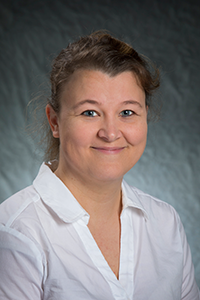VoiceThread meets podcasting to optimize student engagement
When Dr. McKinzie Hall started teaching online courses in 2016 at the University of Louisiana at Lafayette, she wanted to find a way to draw students into her new political science class, Crime and Popular Culture. The answer came from her favorite media: podcasts.
 A self-professed “podcast nerd” Dr. Hall leveraged the growing popularity of true-crime podcasts like "Serial" and "In the Dark," both of which are driven by investigative journalism and have won national Peabody Awards for innovative telling of a long-form, nonfiction story. “Serial” has set podcast records with more than 300 million downloads.
A self-professed “podcast nerd” Dr. Hall leveraged the growing popularity of true-crime podcasts like "Serial" and "In the Dark," both of which are driven by investigative journalism and have won national Peabody Awards for innovative telling of a long-form, nonfiction story. “Serial” has set podcast records with more than 300 million downloads.
Hall wanted to convey that narrative power to her students.
“Journalists and legal scholars are shining a light on issues by using storytelling. You need a story that people can connect with,” says Hall, an assistant professor of political science.
After studying and discussing the popular podcasts, Hall’s students work in groups to do research and develop their own podcasts centered on a real person’s story, investigating social policy issues such as wrongful convictions.
“They can use any individual’s story they want to tell that shows a broader policy issue demonstrating law or crime or political justice,” she says.
During a recent presentation, Hall said one of her student groups is working with someone who was wrongly convicted and recently released; another group recently met with a documentary producer working on a film about a similar case.
“I’ve been pretty impressed with how engaged they are,” she said. “...I’ve found this to be really helpful to get them to start doing some research about different issues.”
Their final project is a 15- to 20-minute initial episode of a podcast and script, using VoiceThread. The program allows both instructors and students to create collections of media — videos, audio files, documents and presentations — that can be shared with each other as a web link.
Crime and Popular Culture is a hybrid course, meaning that it includes both online classes and occasional face-to-face sessions for group members to meet and for Hall to help students work through concepts.
Totally online and hybrid courses offer “a great opportunity to meet students’ needs,” Hall says. As more students have jobs and work schedules, the online environment is more conducive than traditional classes in allowing schedule flexibility.
That also fits well with Hall’s schedule. She is the coach of the school’s moot court team, a group of students who practice giving oral arguments and presentations for appellate courts. She and her team, undergraduates who are often in pre-law studies, often travel to law schools for moot court competition.
Hall said once she’s able to assess the course with Instructional Designer Angela Lee, she would like to make the course 100-percent online.
She encourages other faculty members to teach in the digital classroom. Although it requires a different kind of class management, she says instructors “can put things into the course and prepare in advance in a way, so students can be aware of everything coming in the semester. That’s really helpful, being able to sit down well in advance, and lay things out.
“And you will be able to get perspective from a whole different group of students.”
